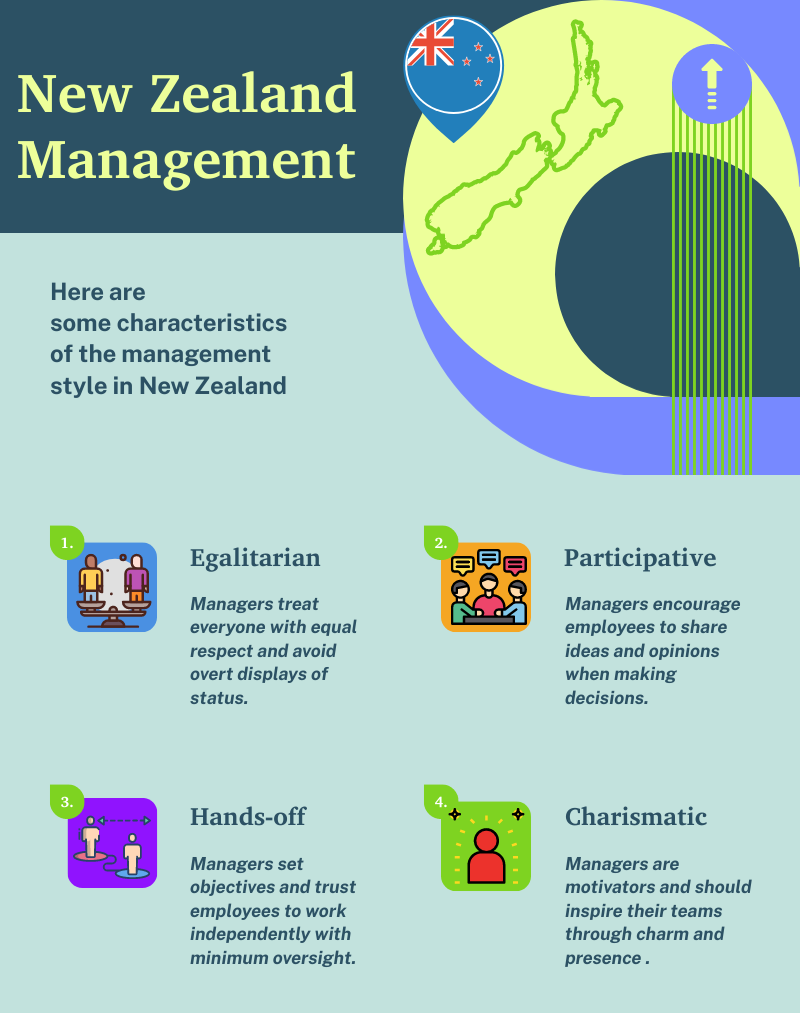
Cross Cultural Management Guide for New Zealand
The information offered below is for managers who want to learn more about the management style and business culture of New Zealand.
It provides some useful insights for managers who are relocating to the country for employment as well as those who may have Kiwi employees in their global or multicultural teams.
Topics include:
- Hierarchy
- Leadership style
- Time and scheduling
- Communication style and;
- Negotiation style
Being a Manager in New Zealand
The business culture in New Zealand is founded on egalitarian principles. It's important to treat each and every person with equal respect and deference.
- This is evident in the communication style which is open and honest, regardless of rank or seniority.
- Managers should avoid "hard sell" techniques and instead focus on good communication.
- Kiwis are hard workers, so a more relaxed attitude to work can be taken as indicative of a lack of professionalism.
- In New Zealand, there is a sense that all people in the organization have an important role to play and all are valued for their input.
- Managers will lose no respect in consulting employees.
The Role of a Manager
Managers new to New Zealand, and the culture, need to initially recognize that employees at all levels bring something individual to the table.
- Managers are expected to get the best out of the individuals that constitute their team.
- Employees are generally consulted on decisions that affect them and the greater good of the organization.
- Managers emphasize achieving a goal, productivity and profits and expect their employees to do their job in a professional manner.
- Successful managers will remember that the role of the leader is to harness the talent of the group assembled and develop any resulting synergies.
Approach to Change
Kiwi culture is relatively open to change and taking on risks.
- Businesses especially have a high tolerance for taking a chance and a ready acceptance to do things differently.
- The underlying mindset is that change, while difficult, usually brings improvements and that hard work and innovation will bring a better tomorrow.
- Underlying this readiness for risk and change is a generally optimistic and positive mindset, which believes that hard work and innovation will bring a better tomorrow.
- Successful entrepreneurs who have achieved enormous wealth are admired as heroes and icons as evidence of New Zealand’s land-of-opportunity mythology.
Time and Priorities
The expectations of working globally have resulted in Kiwis adopting relatively strict standards of adhering to schedules.
- Adherence to schedules is important and taken seriously.
- In New Zealand, missing a deadline is a sign of poor management and inefficiency, and will shake people’s confidence.
- Since Kiwis respect schedules and deadlines, it is not unusual for managers to expect people to work late and even give up weekends in order to meet target deadlines.
Decision Making
In large companies, managers tend to be task-oriented but do not generally micro-manage their staff.
- Since New Zealanders are both egalitarian and avid sportsmen, they understand the benefits to be gained by working in teams to achieve a common goal.
- It is important to follow through on commitments as it fosters a feeling of trust.
- If you do not do what you say you will do, you will be branded as unreliable. This is true whether you are the boss, the employee, or a visiting colleague.
- Under-promising and over-delivering are keys to building trust the Kiwi way.
- Managers are appointed to their positions based on their performance, trustworthiness, and honesty.
- Kiwis try to maintain a balanced life style, although this is becoming increasingly difficult in a global economy.
Boss or Team Player?
The egalitarian focus of Kiwi values supports a collaborative and participative management style.
- Kiwis are often quite comfortable working in teams and do not expect to be singled out for their contribution.
Communication and Negotiation Styles
To ensure successful management, you must understand that the negotiating process takes time.
- Kiwis can be indirect when communicating.
- They tend to avoid confrontation and take careful measures to remain polite throughout discussions.
- People often use softeners when making requests or when giving orders (for example,. “I was just wondering whether you might be able to…”).
- They tend to be quite self-deprecating both in their conversation style and humour.
- Start your negotiations with a realistic figure. Since this is not a bargaining culture, New Zealanders do not expect to haggle over price.
- Do not make promises you cannot keep or offer unrealistic proposals. Kiwis do not generally trust people who have to oversell.
- Swearing is quite common in New Zealand.

Get Expert Support
Why not take a two-hour live webinar, customised to meet your unique needs, with one of our New Zealand business experts?
They can help you navigate Kiwi culture with ease.

 +44 0330 027 0207 or +1 (818) 532-6908
+44 0330 027 0207 or +1 (818) 532-6908

